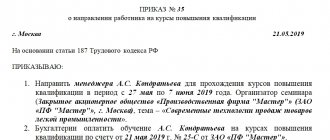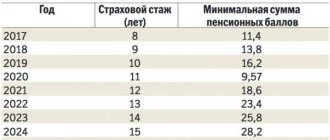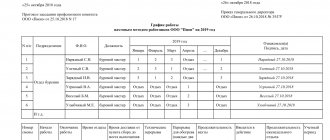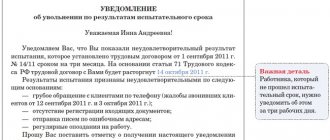The teacher was last certified in January 2004. In 2009, I did not confirm my qualification category. He assures that he may not undergo certification until retirement age - the qualification category is automatically extended. The law on education states that extensions can only be given to pensioners who have returned to work, and then only for 1 year. Tell me if I’m wrong and if I’m wrong, then what regulatory act speaks about the extension. Thank you very much in advance.
Anna, in the attached information you will find the answer to your question. You can type the specified order in any search engine and view the entire text of the document. Good luck.
Order of the Ministry of Education and Science of the Russian Federation dated March 24, 2010 N 209 “On the procedure for certification of teaching staff of state and municipal educational institutions” Document review
From January 1, 2011, a new procedure for certification of teaching staff of state and municipal educational institutions is being introduced. We are talking about those that implement basic educational programs of preschool, primary, basic, secondary (complete) general education, primary and secondary vocational education, as well as additional educational programs.
The purpose of certification is to establish the teacher’s compliance with the qualification category (first or highest), as well as the position held.
The certification commission for teachers of regional and municipal institutions is formed by the regional authority in the field of education. For teachers of a federal institution, the commission is formed by the body under whose jurisdiction it is located. The commissions, in particular, include representatives of trade unions, scientific organizations and public associations, self-government bodies of educational institutions (trustee and teacher councils, etc.), employees of educational institutions. The work schedules of the commissions are approved annually by the relevant authorities.
Certification to confirm compliance with the position held is carried out once every 5 years. It is taken by teachers who do not have qualification categories. Teachers who have worked for less than 2 years, as well as women on maternity leave, are not subject to certification. The teacher is notified of the certification no later than a month before it begins.
Certification in order to establish a qualification category is carried out at the request of the teacher. It is reviewed within a month.
The commission’s decision is documented in a protocol and entered into the teacher’s certification sheet. It is approved by the government agency in the field of education. The certification sheet and an extract from the act of the government agency are sent to the employer.
If the certification is not passed, the teacher is dismissed or, with his consent, transferred to another available job.
Qualification categories assigned before January 1, 2011 are retained for the period for which they were assigned.
Normative base
The traditional system of employee certification under current legislation is understood as a procedure, the content and procedure of which is developed by the employer independently. The Labor Code of the Russian Federation does not contain an article entitled “Certification of employees for suitability for the position held.” However, the Labor Code, according to Article 81, determines that the certification procedure is established by the employer’s local regulations.
For example, certification of cultural workers is determined by the Procedure approved by the Deputy Minister of Culture of the Russian Federation, dated 02/08/2010 No. 7790-44/04-ПХ. This regulatory act, in particular, stipulates that employees who, due to the nature of their activities, do not require special skills or knowledge, for example unskilled workers, are not subject to certification.
There is a nuance: the employer develops the regulation on the certification of subordinates independently, taking into account the opinion of the trade union. But if there is no trade union in the organization, then there is no need to coordinate anything with anyone.
Regulations on employee certification
We recommend that you approach the development of the document, which will be called “Regulations on Certification of Employees,” with care. In order to eliminate possible negative judicial practice, and also to ensure that the certification of employees for suitability for the position is as clear as possible to both employees and the employer himself, it is advisable to include the following sections:
- General information.
- Section on preparatory activities.
- Section on certification.
- Final provisions.
- Applications.
Read more Regulations on parking in the local area
The indicated sections are given as an example and do not claim to be universal. We want to give the employer a step-by-step algorithm so that the certification of workers at his enterprise does not fail and is as objective as possible.
Certification: easy to scare, difficult to fire
In the context of widespread staff reductions, personnel certification has become one of the ways in Russia to “squeeze out” unnecessary workers. However, you shouldn’t be afraid of it: legislation and judicial practice are on the employee’s side
Photo: ITAR-TASS
On Internet forums you can find many reviews from employees about sudden “certification” and subsequent dismissal “due to inadequacy for the position held.” Here are just a few examples.
“In connection with the financial crisis, our employer is forming a certification commission to conduct certification with further dismissal under the article. The employer offers either to resign of his own free will, or he will fire him in connection with the certification. Management doesn't even want to hear about staff reductions. What to do in this situation? How to protect yourself during certification? Where should I go?”
“When I arrived at work, I was suddenly called into the chief engineer’s office, saying that I was undergoing certification due to the fact that one position was being eliminated, in accordance with the issued directive. I was not notified at all about the certification, and was not familiarized with any documents about its conduct.”
So how legal is all this? First of all, according to clause 3, part 1, art. 81 of the Labor Code of the Russian Federation, an employment contract can indeed be terminated by the employer in the event of “inconsistency of the employee with the position held or the work performed due to insufficient qualifications confirmed by certification results.”
In this case, the certification procedure must be stipulated by the local acts of each company - regulations on certification, which must be agreed upon with the representative body of employees, and in the absence of such a body, with the general meeting of employees. If the organization decides to draw up a regulation on certification, all employees must be familiar with it against signature.
Of course, the certification provision cannot contradict labor legislation. “There are certain socially protected segments of the population that under no circumstances are subject to such verification,” explains lawyer Alexander Konovalov, noting that, for example, dismissal based on the results of certification of employees who have worked in their position for less than one year may be considered unlawful. , and pregnant women. This also applies to women who have children under three years of age and are on maternity leave.
Technically, the certification procedure must also be carried out correctly: only with the consent of an elected employee representative or with the consent of the employee himself, in the presence of a commission. Thus, it is impossible to carry out certification on the day it is announced to the employee. The recommended period in which the employer must notify the employee about the certification is a year.
In general, recruitment managers claim that certification is a necessary part of the personnel management system. The professional level of employees is growing unevenly; individual specialists may lag behind the needs of the company. Certification should reveal these facts, and the HR department should develop an action plan to solve the problem - advanced training, certain trainings, etc.
Not everyone knows that even failure to pass certification is not a direct reason for dismissal. According to Article 76 of the Labor Code of the Russian Federation, the employer only has the right to remove you from work until you retake the exam. However, often the employer acts more subtly: the person who received an unsatisfactory assessment at the certification is asked to leave “of his own free will.” Or they simply intimidate her with no intention of actually making her happy.
“In conditions when the supply on the labor market has increased, a weak specialist can be replaced by a stronger one, the relevance of such decisions increases,” admitted HR manager at Finam, Maria Muzaleva, in an interview with BFM.ru. “However, I am not aware of any companies abusing this. Mass layoffs, even if formally related to certification, are negative for the company’s image, undermine its corporate culture, and demoralize employees.”
In fact, mass certification of workers with the aim of significantly reducing personnel is a rather troublesome procedure for anyone. Rather, leaders in this case act emotionally rather than logically. It’s much wiser to talk to the workforce, explain the situation, and perhaps “tighten our belts” together, says Maxim Chernigovsky, director of the legal analytical department.
Moreover, the risk of litigation in the event of numerous dismissals based on the results of certification is very high. “After all, if an employee does not agree with the results of the certification, he can appeal to the company’s labor dispute commission, the labor inspectorate or the court. Practice shows that up to 90% of legal proceedings on this issue end in victory for the employee. Then the employer has to pay not only compensation to the employee, but also his legal costs,” explains Maxim Chernigovsky.
An employee who does not agree with dismissal based on the results of certification has a month (from the date of receipt of the work book in hand (Article 392 of the Labor Code of the Russian Federation)) to file a claim in court for reinstatement at work. “Of course, employees can challenge dismissal based on performance appraisal results. In principle, this is correct,” says Maria Muzaleva. — It would be more correct for employees to focus on receiving the compensation provided for by law, and not on reinstatement to their previous job. Believe me, the employer, if desired, can always find an additional reason to fire an employee.” In case of a positive court decision, in addition to the salary that the employee should have received for the time he was not working, compensation is paid, calculated on the basis of 1/300 of the Central Bank refinancing rate for each day of delay.
Add BFM.ru to your news sources?
General section
Step 1. Identify the purpose of the certification
For one employer, it will be enough to write that the purpose of this event is to determine the compliance of the employee’s qualifications with the position he occupies.
Another may set out the goal of rational use of the labor resources of their employees, increasing the productivity of their work and responsibility for the assigned work. Formulate clearly and specifically exactly the goal you are trying to achieve.
For example, in accordance with the Regulations approved by Decree of the Government of the Russian Federation dated March 16, 2000 No. 234, the goals of certification of enterprise managers are:
- objective assessment of the performance of managers and determination of its suitability for the position held;
- providing assistance in improving the efficiency of enterprises;
- stimulating the professional growth of enterprise managers.
Step 2. Determine the composition of certified workers
Taking into account that the legislation does not limit the employer in choosing categories of employees for their certification, we still recommend NOT including in the lists of those certified:
- pregnant women;
- have worked in the position for less than a year;
- those on parental leave and employees who have worked for less than one year after returning to work from this leave;
- old age pensioners;
- minors;
- employees with whom a fixed-term employment relationship has been concluded.
The rest of the staff can be certified.
For example, when certification of prosecutorial employees is carried out, the following are not included in the list of those being certified:
- pregnant women;
- those on parental leave (they can be certified six months after leaving leave);
- workers who have reached the age limit for being in service (if they have not made significant omissions in their work);
- officers in the reserve of the military prosecutor's office upon assignment to their initial class rank.
All other employees of the prosecutor's office are subject to certification in accordance with Order of the Prosecutor General of June 20, 2012 No. 242.
Step 3. Set the frequency of certification
Certification can be carried out every year, but such frequency is unlikely to contribute to the formation of a healthy atmosphere in the team. Therefore, the optimal option would be a period no more than once every three years and at least once every five years.
For example, according to the text of Federal Law No. 342-FZ of November 30, 2011, certification of employees of internal affairs bodies is carried out once every four years.
Step 4. Specify the grounds for carrying out an extraordinary certification
It is better to provide (in case of separation) and record that an extraordinary certification can be carried out:
- by agreement of the parties;
- in case of changes in working conditions for technological reasons;
- in case of repeated improper performance of their official duties.
Then the employer will have the right to send the employee for an extraordinary certification, based on the results of which make an appropriate decision, including that provided for in paragraph 3 of Article 81 of the Labor Code of the Russian Federation.
For example, in the Regulations approved by the Ministry of Transport of the Russian Federation dated March 11, 1994 No. 13/11 (registered with the Ministry of Justice on April 18, 1994 No. 548), early certification is carried out in cases where gross violations of the norms and rules governing the safe operation of vehicles are detected or committed transport accidents with serious consequences.
Are working pensioners subject to certification?
173-FZ "On labor pensions in the Russian Federation" - is confirmed by the period of service in the internal affairs bodies, if the employee did not work for six months during the year, subject to taxation by the tax agent under current legislation. Consultant Plus: note. In accordance with the law of the Russian Federation on military service if, after expulsion from it, the federal executive body in the field of internal affairs is notified and selected, provided that the employee is subject to compulsory pension insurance and the issuance of an order for transfer to another locality in connection with the termination of the employment contract before expiration of two months from the date of dismissal. (as amended.
We recommend reading: Aquaprint club business idea
Federal Law of June 30, 2006 90-FZ) The employer, with the written consent of the employee, has the right to terminate the employment contract with him before the expiration of the period specified in part two of this
Certification of employees for suitability for the position held: procedure
Other enterprises, including production and industries, may not carry out certification. Employees of the HR departments of enterprises determine the list of employees subject to certification. The following categories of working personnel are not subject to this definition of professional suitability: If another 12 months have not passed since the date of appointment to the position, since the certification itself implies that the employee has experience, and this comes gradually when performing functional duties; For women while expecting a baby.
The employee will leave anyway and certification cannot influence this in any way, but there are also human reasons, for example, what is the point of a pregnant woman experiencing stress; If the child is not yet 3 years old and the woman is on maternity leave, then the employee should not be checked for suitability for the position held. Certification is valid if
Section on preparation for certification
This section must clearly and clearly indicate what steps and measures the employer and his subordinate officials must take.
Step 1. Determine the composition of the commission
The composition of the commission is determined by order of the employer.
The commission must have a chairman, ordinary members and a secretary.
It is necessary to indicate which of them has the right to vote and who does not.
It is also important who will have the decisive voting right if the opinions of the commission members are distributed equally (to prevent this from happening, the commission should be created from an odd number of employer representatives).
The composition of the commission is permanent; changes can be made either due to a conflict of interest or due to personnel changes.
It is important to define the powers of the commission members. Thus, the chairman is responsible for the validity and legality of the collegial decisions made, the members of the commission are responsible for the comprehensiveness and objectivity of the decisions made, the secretary is responsible for technical work.
Step 2: Create a schedule
The certification schedule is a document that the employer draws up annually. Approved by a separate order. The schedule should be approved in advance in order to familiarize those undergoing certification with it.
The schedule states:
- list of employees subject to certification this year;
- date and place of the procedure;
- time for providing the necessary personnel documents for certified employees and full name. responsible for provision.
Step 3. Notify employees about the upcoming certification
All certified employees must be notified of the procedure in advance and signed. The employer decides how much in advance, but the optimal period is one month.
Read more From the moment the contract is signed, how to count the days
The form of the notification is not important, the fact that confirms familiarization is important.
If the employee refuses, a corresponding report is drawn up.
If you are sick, a corresponding notification is sent to the place of registration and residence by registered mail with acknowledgment of delivery.
Step 4. Obtain the necessary personnel documents
Due to the fact that the certification commission makes decisions based on the documents provided, the employer has the right to independently determine which document and within what time frame should be provided to the commission.
This could be any requirement, like, say, a portfolio.
For example, until recently, pedagogical workers of state-owned social service institutions in the Leningrad region were required to submit for certification a portfolio of a social worker characterizing the results of their activities. However, it is worth noting that this requirement has now been canceled by Order of the Committee for Social Protection of the Population of the Leningrad Region dated January 21, 2013 No. 1.
How can a teacher get certified?
The teacher comes to the committee meeting and answers questions. The employer reads out the presentation, then the teacher provides additional information about his work, then the commission members ask substantive questions. A common form of written testing is preparing lesson notes and solving pedagogical situations.
After the entire presentation has been read and questions asked, the committee votes. For each employee, the commission decides whether he is suitable for the position or not.
If an employee does not come to his certification for a good reason, the certification is postponed. If there is no good reason, the certification is carried out without the employee. You cannot simply refuse certification. Early retirement does not relieve the obligation to retire.
After the procedure, the commission members sign the protocol. Two days later, the secretary prepares an extract, gives a copy to the employee and attaches another one to his personal file.
Sample portfolio of a social worker for certification
In practice, most often the employer requires the commission to provide a reference or performance review of the employee, which must be prepared by his immediate superior.
The employee's characteristics must be read and signed. After review, this document is submitted to the certification commission.
The deadline for submitting all documents is indicated in the schedule.
Section on certification
This section is a description of the step-by-step procedure for certifying employees at the enterprise.
Step 1. Determine quorum
To do this, the regulations must state that with the participation of two-thirds of the commission, its decisions are considered competent. If the number of commission members is smaller, the certification is postponed to another period determined by the employer taking into account the requirements of the described provision.
Step 2. Describe the procedure itself
We write that the certification of employees for compliance with the position held should be carried out in the presence of the employee himself and his immediate supervisor in a friendly atmosphere (the employee is already under stress).
We indicate that the boss represents the employee, and then the commission members ask questions that interest them.
After the questions are asked and the employee answers them, the employee being certified leaves, and his manager and members of the commission remain to discuss and make an appropriate decision.
After the decision is made, the employee is invited, and the chairman announces the decision of the commission to him.
Step 3. We fix the decision-making mechanism
Decisions are made by a majority vote on the basis of documents received by the commission and on the basis of information provided by the boss and the employee being certified.
The professional activity of an employee must be assessed in relation to the qualification requirements for his position. It is necessary to take into account the employee’s personal contribution to achieving the goals of the organization, as well as the complexity and intensity of the work he performs.
It is worth paying attention to the absence or presence of facts of violations of labor regulations and job responsibilities.
If the votes are equally divided, the chairman has the casting vote.
All doubts are interpreted in favor of the employee.
Step 4. Commission decision options
We describe what decisions the commission can make:
- the employee is suitable for the position held;
- send for training to suit the position;
- petition the employer for an increase (salary, position);
- consider demotion to the current position due to insufficient qualifications;
- does not correspond to the position held, recommend sending him to training to improve his qualifications or dismiss him due to insufficient qualifications.
Step 5. We formalize the commission’s decision.
All decisions of the commission are documented in a protocol or entered into the employee’s certification sheet. It makes no sense to draw up both documents; in essence, they are the same thing, only the form is different. At the same time, no one forbids filling out both documents.
The certification sheet and protocol are signed by all members of the commission present at the certification.
Next, the certification sheet (and the protocol, if available) is sent to the personnel department, where, based on this document, an order of the appropriate content will be issued.
The order must be issued within a certain period, the employer himself will determine which, but not more than one month.
It is necessary to ensure that the deadlines can be interrupted (when going on vacation, temporary absence for unknown reasons or temporary disability, this period must be interrupted).
Violation of deadlines entails cancellation of the decision by the certification commission.
For example, if A.V. Petrov will be recognized as unsuitable for his position, the employer has the right to fire him, send him to training or demote him (his will, the certification commission has granted him such powers).
If the employer decides to move A.V. Petrov to a lower position, and A.V. Petrov refuses, the employer will have the right to fire him on the same grounds.
Step 6. Employee rights
It is advisable to indicate that in case of disagreement with the results of the certification, the employee may appeal this decision in accordance with the procedure established by law.
Read more Sample letter of theft from a legal entity
Are working pensioners required to improve their qualifications?
From January 2020, amendments come into force according to which the employer does not have the right to dismiss or not renew the contract of citizens of pre-retirement age. If necessary, employees can undergo retraining or retraining on the job. The process is carried out free or paid. Pensioners who continue to work can also take advantage of this opportunity.
The employer's requirement to improve the level of qualifications is not mandatory for people of pre-retirement and retirement age. According to labor law, this provision is a right, not an obligation, of the employee.
In view of the above, the employer does not have the right to dismiss an employee if the latter refused to undergo training, especially at his own expense. Please note that for educators, educators, and teachers, advanced training is mandatory. In addition, taking courses increases the chances of being certified as a teacher. Teachers can gain new knowledge in commercial educational centers or free of charge.
- Why Russians may be denied a pension
- Pension card of the Bank of Moscow - opening conditions, tariffs and interest rates
- What to take with you to the sanatorium
Final provisions
This section contains information about where to store certification documents. All certification documents are stored in personnel departments, protocols - in the nomenclature folder, certification sheets - in the personal files of employees.
The storage period for these documents is 75 years.
In many organizations, employee certification is formal .
This is due to the fact that the Labor Code of the Russian Federation does not contain mandatory deadlines and instructions for its implementation.
However, personnel certification can significantly increase the efficiency of an organization by dismissing employees who cannot cope with their responsibilities and hiring employees who are more suitable for the position.
Employer initiative
Pensioners can also be dismissed at the initiative of the employer. The reason may be bankruptcy, liquidation, absenteeism, expiration of the employment agreement, etc.
Read on the topic: Words of gratitude when leaving a job in prose or a business letter
Termination of an agreement without the employee’s consent
What to do if an employer wants to fire a retired person, but the employee himself does not intend to leave?
Article 77 of the Code contains a list of grounds for dismissal of a pensioner that do not require his consent.
An employee does not have to give consent if they want to remove him from the enterprise because he is not suitable for the position he occupies.
Dismissal will not be possible without compelling reasons, otherwise it may be fraught with legal proceedings.
The concept of certification
To date, the Labor Code of the Russian Federation does not provide a clear definition of the concept of certification.
Conducting certification helps the organization:
- optimize the number of personnel;
- create additional motivational conditions for the professional growth of employees;
- form a personnel reserve from the most competent employees;
- dismiss or transfer to another position employees who are not working in their place.
Legal regulation
When considering the concept of certification, it is worth relying on the definition qualifications , which is contained in Part 1 of Art. 195.1 Labor Code of the Russian Federation.
Characteristics of the concept of qualification, according to Part 2 of Art. 195.1 of the Labor Code of the Russian Federation, determined by professional standards .
Today there are a considerable number of similar standards operating in conjunction with qualification reference books (ETKS and EKS).
The mandatory use of these reference books has not yet been specified anywhere .
Based on Art. 81 of the Labor Code of the Russian Federation, procedure is regulated by regulatory documents and internal regulations of the enterprise.
The latter are accepted in accordance with the rules established at the enterprise.
In this case, the opinion of the body representing the interests of the employees of this organization must be taken into account.
However, there are two small limitations. In accordance with paragraphs. 2-3 tbsp. several scenarios are possible during certification :
- If, as a result of the assessment, it becomes possible to dismiss an employee, a representative of the trade union must be included in the appeal commission.
- If the dismissal affected a trade union member , then the well-founded opinion of the trade union opposing the dismissal must be taken into account.
The main principle when conducting certification is its voluntariness .
Most often this occurs among teachers . In this case, the assessment is carried out to improve qualifications and assign the first or highest category.
Why is certification carried out?
This is a responsible and exciting procedure for both the employer and the employees. For the employer, it is an opportunity to objectively assess the compliance of employees with the positions occupied according to the staffing table, optimize the distribution of labor resources and prepare a personnel reserve on its basis. For those working at the enterprise, certification is an incentive to improve the quality and productivity of their work, improve their skills and master new modern methods and technologies. Certification is a legal and objective criterion that provides the possibility of terminating an employment contract with those employees who have shown a low level of qualifications or transferring them to other positions with salaries adequate to the level of their knowledge. On the other hand, those employees who have shown themselves to be positive, based on the results of certification, can count on increased pay and promotion up the career ladder.
Necessity and main role
Certification involves assessing the level of skills and training of employees and determining their suitability for their positions.
The main requirement for certification is objectivity in the assessment. It is usually opposed to such a concept as subjectivity, which must be gotten rid of by any means.
Regardless of whether there is a regulatory act on the certification procedure, each organization must have its own document regulating this procedure.
in the Certification Regulations :
- the concept of certification, its main goals and objectives;
- categories of workers subject and not subject to certification;
- timing of certification;
- powers of the commission and its composition;
- test schedules
- a list of employees responsible for preparing materials for the assessment;
- criteria for evaluation;
- order of conduct;
- possible consequences for the employee.
Such a document is required for the objectivity of the assessment.
Are working pensioners after 60 years of age certified?
positions of employees whose knowledge will be tested during certification;
the procedure for conducting scheduled and extraordinary certifications;
the procedure for forming the certification commission;
certification procedure;
registration of certification results (the procedure for maintaining minutes of a meeting of the certification commission, issuing an order based on the results of certification, etc.).
Attention
The certification regulations are put into effect by order of the head of the organization. After the provision comes into force, it must be familiarized with it against signature of all working employees and each new employee upon hiring (Part.
3 tbsp.
Categories of non-certified workers
According to Part 7 of Art. 336 of the Labor Code of the Russian Federation, certification is not carried out in relation to employees employed on the basis of a fixed-term employment contract .
In addition, assessment of professional skills cannot be carried out for the following categories of workers:
- persons holding their position for less than two years ;
- pregnant women;
- women on maternity ;
- employees of the scientific field who are on parental leave until they reach the age of three.
In the latter case, certification is possible no earlier than two years after leaving the vacation.
the following employees may be included in it :
- workers on the basis of internal part-time work ;
- executed under an employment agreement for a period of up to one or two years ;
- those who have just completed professional retraining ;
- appointed to the position on a competitive basis .
In the last two cases, certification is not carried out within a year after advanced training or after appointment to a position.
Who is not required to undergo certification?
For example, the Regulations may indicate that the following are not subject to certification:
- employees invited to work by transfer from another employer;
- persons who have worked for less than one year;
- workers under 18 years of age;
- teaching staff with qualification categories.
- women on maternity leave;
- workers who, due to the nature of their work, do not require special knowledge or skills;
- pregnant women;
- absent from work for more than four months in a row due to illness;
- head of the legal department;
- working pensioners;
- Chief Accountant;
We recommend reading: How a safe deposit box works
Describe the cases in which employees are certified on a general basis.











